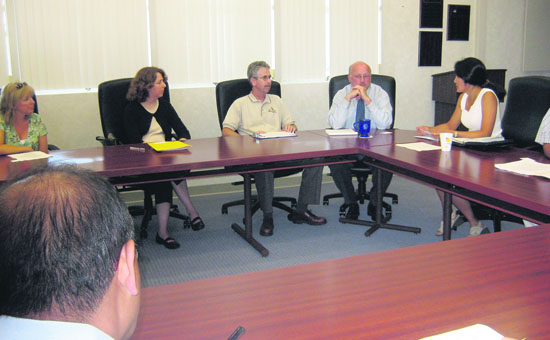| | Published September 17, 2008
| No More Pesticides at Local High Schools
| | By Sophie Braccini |  | | PfSE meets with AUHSD's Chris Learned and Steve Fishbaugh Photo Sophie Braccini |
Chris Learned, Assistant Superintendent of the Acalanes Union High School District (AUHSD), promised a group of parents on September 2nd that AUSHD will ban the usage of all pesticides and herbicides on its sports fields.
The twelve parents, representing Parents for a Safer Environment (PfSE), were pleased; in their view this a major step in protecting our children from the dangers of chemicals.
Susan Junfish, founder of PfSE, said, "We have had parents with kids going to the Acalanes School District asking us to help evaluate the District's pest control program for years. We had been trying to meet with the District for a little while after acquiring and reviewing some tracking documents called Pesticide Use Reports." Junfish added, "We didn't know what to expect from the District."
Learned invited Maintenance Supervisor Steve Fishbaugh to the meeting. Fishbaugh knows exactly which and when pesticides have been used by the District. PfSE came with a list of products and respective toxicity profiles that had been assembled by their intern, Campolindo Senior Molly Howland.
The list included ten products that had been used by the District between 2006 and 2008, according to the District's Pesticide Use Reports. Of those, Fishbaugh confirmed that five were still being used by the District, and 3 of the 5 were considered high risk by the group: Gopher Getter (contains Strychnine), Sevin Insecticide (with Carbaryl for ants) and Turflon (Triclopyr), an herbicide that is used by the district to control the proliferation of clover in the fields.
"Sevin is a likely human carcinogen, a neurotoxin, a hormone disruptor and a groundwater contaminant" said JunFish, "Gopher Getter also can contaminate ground water and has high toxicity; besides gophers can become resistant to Strychnine so it's not even the most effective, and Turflon is a high risk product containing the developmental and reproduction toxin triclopyr."
Learned was very worried about the exposure of children to these products, and he asked the group for their sources of information. He and his staff were concerned with the feasibility of stopping the use of chemicals. "We have lost 2 maintenance and one ground employee due to the budget cuts," said Fishbaugh, "with less personnel we cannot manually remove weeds or chase gophers."
Carol Shenon, another member of the group that has done a lot of research and outreach for the Moraga School District, explained, "It is important to disseminate this information to parents, so they understand why there is some clover in the fields or weeds along the fences." She believes that when parents understand that the long term health of the children is at stake, they readjust their priorities.
Junfish suggested some alternative treatments; although the District staff did not appear to be convinced that they would work Learned decided nonetheless to stop the usage of the three products. The only pesticide/herbicide that the District will use will be Round Up along the edges. According to PfSE that product is the least toxic, the only risk is air contamination when high volumes are spread.
The parents finished by asking to present a request for an Integrated Pest Management policy to the AUHSD Board. "What you have just done today is remarkable," said Junfish, "but you will move on at some point and it would be effective to have a policy in place for the years to come." Learned agreed to study the issue, but was not favorable to formalizing a policy at this time.
|
 | |
 | | | |
